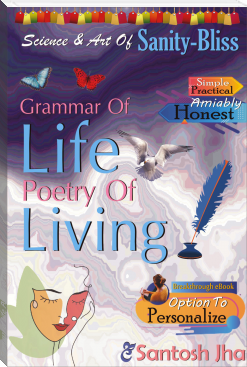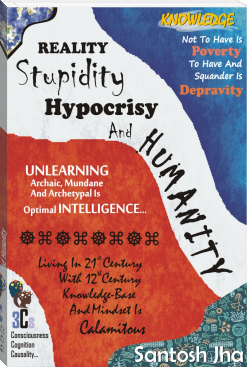Grammar of Life, Poetry of Living by Santosh Jha (motivational novels for students txt) 📕

Read free book «Grammar of Life, Poetry of Living by Santosh Jha (motivational novels for students txt) 📕» - read online or download for free at americanlibrarybooks.com
- Author: Santosh Jha
Read book online «Grammar of Life, Poetry of Living by Santosh Jha (motivational novels for students txt) 📕». Author - Santosh Jha
The primary aspect of the above description is to bring home the reality that we and our lives attain optimal and better wellness and joyfulness when we become conscious and aware of our own deeper self and equally consciously align and relate our live-living with larger field and landscape of Information in the external milieus. This sure is not a new idea. It has been there since over 3000 years. This idea is now more relevant. We list out some steps and ways, which may lead us to this idealism –
STEP 1 – We need to understand and accept that in all aspects of life-living, the element of harmony and rhythm is very crucial. That is why it is of paramount importance that we assign attention to Pace of our life and living. We are essentially Information and our consciousness is an emergent reality of complex processing going inside our brain. There are innumerous processes going on inside our body plexus too. They all need to be in an optimal and ideal state of harmony, poise and rhythm. The processes also require some time to emerge and express. This necessitates that we regulate the speed and pace of our daily life routine. The homeostatic requirements need good amount of rest, sleep, leisure for conscious retrospection and thoughtfulness and peaceful processing of all information. In contemporary life-living, let alone adults, even small kids are so busy and are constantly moving from one task to other. Most people are so used to fast pace and unending activities that they cannot sit in leisure and calm state of body-mind for an hour. It may sound ridiculous but it is a reality that most of us do not even know how to eat rightly. Most of us also do not breathe rightly. First, we eat much more than what is ideal for one time meal. Secondly and more importantly, we eat too fast and gulp too big a morsel in one go. Moreover, in modern milieus of high-paced life-living; many of us do not eat our meals or foods in sedentary mode and with people we love. Ideally, we should eat only when we are in calm, composed and happy state. This is necessary because then only we can truly experience optimally the bounties of food. Small portions and small morsel at a time enhances the experiences of tastefulness and satisfaction of eating. In all cultures, there were specific rituals of family gratitude and prayers preceding meals. They were aimed at ensuring that the Field of Consciousness of person having food is optimally zeroed down to holistic processing of Information associated with the food they were eating. This is right and must for homoeostatic idealism. As we have talked earlier; this fast paced life-living, over action-reaction regimen in daily life, continued multi-tasking, et al are very new to human ecosystem. It has happened only in the last few decades. The overall wellness issues have also come up in the same time period, globally. The troubled homeostasis is a reality of recent origin. We sure have to invest in leisure, rest, poise and rhythm.
STEP 2 – Our brain is probably not innately amenable for multidimensional living. Usually, subconsciously, we are wired to focus only on one aspect of a situation at a time. That probably is some archaic and vestiges of mammalian brain, which optimized its survival. Multiple aspect thoughtfulness comes to us usually after the incident happens, reactions are actualized and we are in retrospection mode. This probably is the cortex part brain processing, which emerged later in the evolution of human species and evolved retrospective and lateral thinking. We need to learn the artistry of lateral as well as vertical thinking to create optimal experiences of a situation. As we have discussed, reality is an information landscape and probabilistic. A reality is packaged with multiple possibilities. That is why we need to align with all possible attributes and properties of this information field to have multidimensional experiences of a singular reality or situation. This is the domain of artists but average person must also attain this facility. It does not come easy and that is why a child must be trained to do so very early in his or her journey. For example, when a child is eating something, he or she must be confronted with the questions like; can he guess how this meal is cooked and what ingredients are there? The child also must be made inquisitive about where and how the ingredients are grown, who grows them and what their lives are like. Etc. The idea is that from early days, a person must evolve a conscious registry of the multidimensionality of a reality and situation. It is for sure, when a person is aware of larger landscape of information, it shall have better prospects of acquiring deeper and more experiences of varied nature. This helps in relationships too. Most people are singular in their attention and focus. They do not accept different aspects of a reality and therefore cannot be open and compassionate about those, who live up with other shades of realities. As we have been discussing all along, novel and alternative experiences are true opulence and therefore, it must be ingrained as part of nurturance for children. It essentially is the mind training domain of parents. They should ensure that a child develops this artistry of being sensitive to and respectful to different aspects and dimensions of a reality, in daily life-living. The inquisitiveness for details and hidden layers of a reality must be inculcated from early childhood. We know, this helps a child grow better and later in life understand reality better. It is an established fact that a true intellectual shall always see something embedded in a reality, which most others cannot.
STEP 3 – If we have to define one element, which is exclusively human and has evolved in millions of years to create what we are today; it definitely is emotional richness of our thoughtfulness process. Science tells us that emotions are not exclusive to humans. Most of the higher organisms and bigger animals have emotions. In fact, emotions are part and parcel of the mammalian brain or middle brain plexus of information processing. However, what makes them exclusive in humans is the ways humanity has added shades of feelings into it and in beautifully satisfying artistry these feelings create different utilities and worth in life-living. If we look at the massive plexus of neurons as well as those of chemical processes of hormones, we can clearly see how most of our behavior and actions are guided by our emotional response system. As we have discussed Intentionality earlier; we can say that intentionality at cellular levels are expressed and manifested into behaviors and actions, through the neuro-chemical (hormonal) networks, which essentially are shaped up by emotional spectrum of cognitions. This signifies that humans are essentially emotional beings and this is not only a huge asset but also the seat of most troubles. We all know how most people are poor handlers of emotional response to a situation and end up messing up with their feelings. Emotions are defining media of human wellness landscape as they affect the patterns of behavior and actions. Emotions however are very much like salt in a recipe. There is a very thin line of ‘appropriate’ of use of salt. Slightly less salt makes the food uninteresting and boring. Slightly more salt makes the food inedible. Emotional poise is critical to the multidimensionality of experiences. An emotionally instable person has the innate propensity to react disproportionately and awkwardly to a reality or situation. This makes the person aligned to a consciousness, which is devoid of poise and amicability. Emotional stability is a tough situation as it is innately linked to external milieus and their stimuli. In contemporary world, there is larger threat to emotional stability of a person as he or she is constantly faced with destabilizing stimuli from external milieus of society and cultures. As we have talked earlier, the over-contextual individuality vis-à-vis externalities often confuse emotions and therefore, they engender conflicted feelings. Experts have clearly declared that humanity shall grow into more abstractions and higher and instable emotionalism as milieus and life-living becomes more complex and burgeoning human populations create cannibalistic propensities. As we discussed earlier, three processes of Registry, Internalization and Expression of Information are crucial for wellness. In all the three stages, emotions and their sanity-sanctity-poise is the defining element of homeostatic wellness. Most people get so frustrated with their emotional mishandling of situations, especially in relationships that they intentionally or subconsciously turn into a non-emotional person. They get promptly labeled as Narcissist and this in turn engenders more attitudes. Many others have troubles with expressions of emotions; which we know as feelings. The psychologists are happy to name such anomalies as syndromes of populist consumption. This is alarming situation for wellness. Humans cannot and should not disown emotions. If we do that, we actually kill reality as emotions are gateways to experience reality in multidimensionality. Being a non-emotional person, we actually hamper and dissipate our own wellness landscape. Also, artistic expressions of emotions add to the experiences pool of consciousness. That is why it is important that from early days of childhood, all budding kids must be made to learn to know their emotional pathways, be successful in internalizing them with poise and then learn to have beautiful and meaningful expressions of emotional elements. For that to happen, children must be made to stand good with their language proficiency. The parents have this huge role in making a kid understand that more often than not; the insufficiency of language and grammar adds to the confusion about a reality as languages are the core media of how we accept and interpret reality in personal as well as societal spaces. They also must learn as many arts like music, dance, painting, sculpting, acting, etc. If not; at least they should have a taste for them. Music is very critical for wellness of humans. Animals





Comments (0)